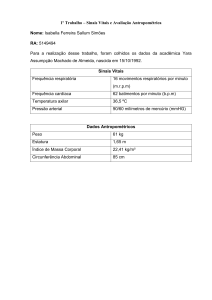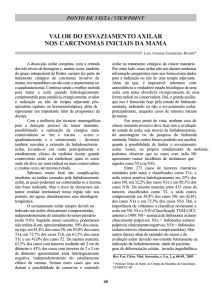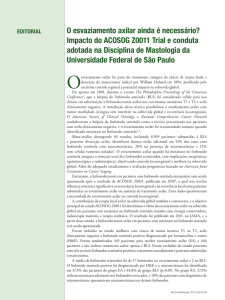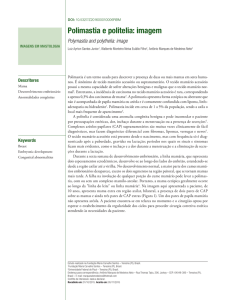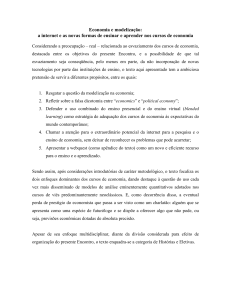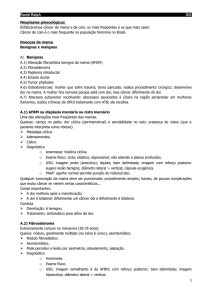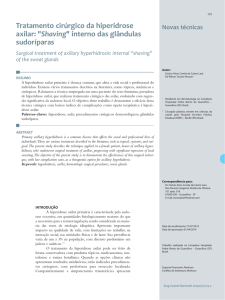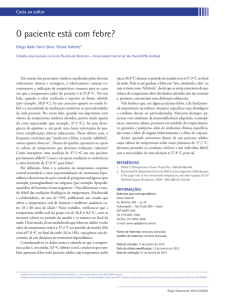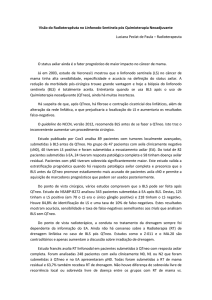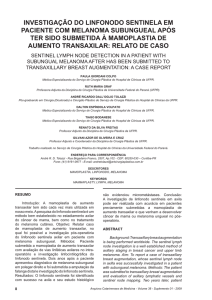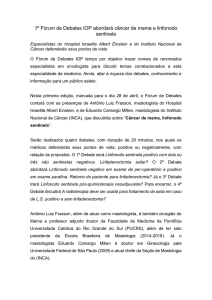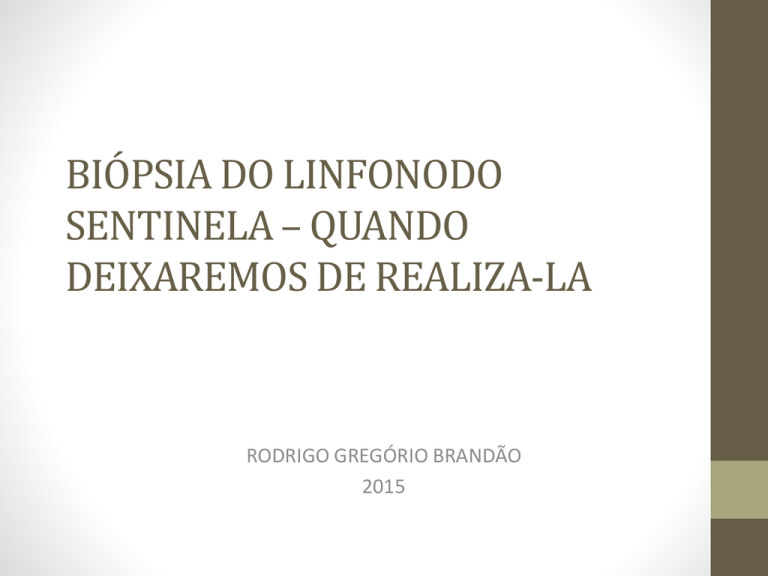
BIÓPSIA DO LINFONODO
SENTINELA – QUANDO
DEIXAREMOS DE REALIZA-LA
RODRIGO GREGÓRIO BRANDÃO
2015
HISTÓRICO
VERONESI
PATEY
GIULIANO
MADDEN
HALSTED
BIÓPSIA DO LINFONODO
SENTINELA
-
Identificação 98%
VPP ~ 100%
VPN 96 – 98%
Falso Negativo 5%
Miltenburg, D. 1998
ESVAZIAMENTO AXILAR
-
Controle Local
Estadiamento Axilar
Melhora SLD
Morbidades
Clarke M. (EBCTCG) 2005
ESVAZIAMENTO AXILAR – EFEITOS
INDESEJADOS
- Complicações cirúrgicas imediatas
(hematoma, dor, seroma, infecção, parestesia)
- Linfedema
- Lesão neural
- Limitação de movimentos
Ashikaga et al., 2010 – NSABP 32
AVALIAÇÃO AXILAR - EVOLUÇÃO
• NSABP – B04 1756 MULHERES
AXILA
CLINICA/TE -
AXILA
CLINICA/TE +
HALSTED
40% Meta Oculta
MASTE + RT
MASTE E EA SE
RECORRÊNCIA
19% recorrência axilar
Fisher B, 1977.
AVALIAÇÃO AXILAR - EVOLUÇÃO
NSABP-04
SOBREVIDA APÓS 25
ANOS
IGUAL
HALSTED
X
MASTE E EA SE
RECORRÊNCIA
Fisher B, 2002
AVALIAÇÃO AXILAR - EVOLUÇÃO
- Z0011 891 MULHERES
BLS +
EA
OBSERVAÇÃO
Sobrevida Global (5a)
91,8%
92,5%
Sobrevida Livre de Recorrencia
83,5%
82,2%
Recorrencia Locoregional
3,6%
2,6%
Giuliano et al, 2011.
AVALIAÇÃO AXILAR - EVOLUÇÃO
CANCER INVASIVO DE MAMA
T1 T2
CIRURGIA CONSERVADORA
PROGRAMAÇÃO DE TRATAMENTO ADJUVANTE
RT
QT/HT
AVALIAÇÃO AXILAR
BIOPSIA LS
PARAFINA
AVALIAÇÃO AXILAR - EVOLUÇÃO
ESTADIAMENTO AXILAR “INCOMPLETO” (APENAS COM A BLS)
PODERIA ALTERAR A INDICAÇÃO DO TRATAMENTO ADJUVANTE?
?
BIOPSIA DO LINFONODO SENTINELA – QUANDO DEIXAREMOS DE REALIZA-LA?
AMAROS TRIAL
2000 mulheres
T1 T2 N0
BLS
BLS -
OBSERVAÇÃO
BLS +
RT AXILAR
EA
Straver M., 2010
BIOPSIA DO LINFONODO SENTINELA – QUANDO DEIXAREMOS DE REALIZA-LA?
RT AXILAR
EA
NÃO HOUVE DIFERENÇA NO TRATAMENTO ADJUVANTE ENTRE
OS DOIS BRAÇOS DO ESTUDO
NA PRÁTICA CLÍNICA O NÚMERO DE LINFONODOS
COMPROMETIDOS NÃO PARECE AFETAR A DECISÃO DA QT
Straver M., 2010
BIOPSIA DO LINFONODO SENTINELA – QUANDO DEIXAREMOS DE REALIZA-LA?
- Eficácia da RT no tratamento da axila casos T1/2 N0 –
aguarda resultados definitivos do AMAROS TRIAL
- Em quais situações podemos abrir mão da BLS?
- Quais são as evidências disponíveis até o momento?
BIOPSIA DO LINFONODO SENTINELA – QUANDO DEIXAREMOS DE REALIZA-LA?
-
Paciente idosa
T1N0
Luminal A
Comorbidades +
IDOSA: ESVAZIAMENTO AXILAR X OBSERVAÇÃO
• Retrospectivo; 1987 a 1992
• 1451 pacientes ≥ 70 anos (N0)
• Excluídas: Câncer de mama bilateral, metástases, outra doença
maligna, margens comprometidas na cirurgia, pacientes submetidas
a mastectomia
• 671 pacientes incluídas no trabalho
• 172 pacientes submetidas ao esvaziamento axilar
• 499 sem abordagem axilar
Axillary dissection versus no axillary dissection in elderly patients with breast cancer and no palpable axillary nodes:
results after 15 years of follow-up. Martelli G et al. Ann Surg Oncol. 2011;1 8(1):125-33
IDOSA: ESVAZIAMENTO AXILAR X OBSERVAÇÃO
• 229 pacientes submetidas a radioterapia da
mama
• Tamoxifeno 20mg/dia para todas as pacientes
• Opção por esvaziamento e/ou radioterapia
coube ao paciente e médico assistente
Axillary dissection versus no axillary dissection in elderly patients with breast cancer and no palpable axillary nodes:
results after 15 years of follow-up. Martelli G et al. Ann Surg Oncol. 2011;1 8(1):125-33
IDOSA: ESVAZIAMENTO AXILAR X OBSERVAÇÃO
Seguimento
• Exame físico
• 6/6 meses por 5 anos
• Anual após 5 anos
• Mamografia e Rx tórax anual
• Cintilografia óssea a cada 2 anos
Axillary dissection versus no axillary dissection in elderly patients with breast cancer and no palpable axillary nodes:
results after 15 years of follow-up. Martelli G et al. Ann Surg Oncol. 2011;1 8(1):125-33
IDOSA: ESVAZIAMENTO AXILAR X OBSERVAÇÃO
Seguimento médio
• 180 meses para o grupo sem esvaziamento
• 196 meses para o grupo com esvaziamento
Objetivos
• Mortalidade por câncer de mama
• Recorrência locorregional
• Recorrência sistêmica
Axillary dissection versus no axillary dissection in elderly patients with breast cancer and no palpable axillary nodes:
results after 15 years of follow-up. Martelli G et al. Ann Surg Oncol. 2011;1 8(1):125-33
IDOSA: ESVAZIAMENTO AXILAR X OBSERVAÇÃO
MORTE: 15 anos de seguimento
pT1
pT2-4b
Axillary dissection versus no axillary dissection in elderly patients with breast cancer and no palpable axillary nodes:
results after 15 years of follow-up. Martelli G et al. Ann Surg Oncol. 2011;1 8(1):125-33
IDOSA: ESVAZIAMENTO AXILAR X OBSERVAÇÃO
RECORRÊNCIA: 15 anos de seguimento
MORTE: 15 anos de seguimento
Ipsilateral breast tumor recurrence
pT2-4b
pT1
Axillary dissection versus no axillary dissection in elderly patients with breast cancer and no palpable axillary nodes:
results after 15 years of follow-up. Martelli G et al. Ann Surg Oncol. 2011;1 8(1):125-33
IDOSA: ESVAZIAMENTO AXILAR X OBSERVAÇÃO
CONCLUSÕES
• Mortalidade similar entre pacientes que foram
submetidas ou não ao esvaziamento axilar
• Incidência cumulativa de doença axilar foi baixa no
grupo pT1 (3,7%)
• Esvaziamento axilar apenas para doença axilar clínica
• Biópsia do linfonodo sentinela poderia ser omitida
Axillary dissection versus no axillary dissection in elderly patients with breast cancer and no palpable axillary nodes:
results after 15 years of follow-up. Martelli G et al. Ann Surg Oncol. 2011;1 8(1):125-33
BIÓPSIA DO LINFONODO
SENTINELA
- VALOR PREDITIVO
- NAO AFETA CONTROLE LOCAL
- NÃO AFETA A SG
CONTROLE
LOCOREGIONAL
QT/HT e RT
BIÓPSIA DO LINFONODO
SENTINELA
QUANDO DEIXAR DE
REALIZA-LA ?


